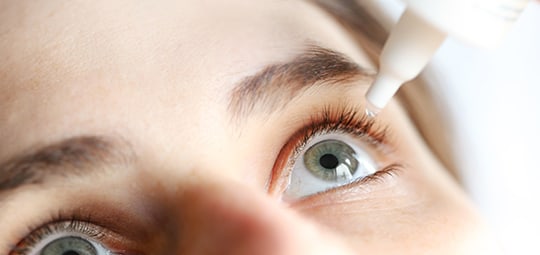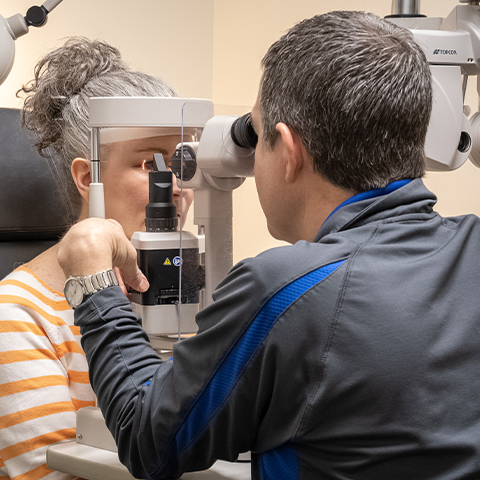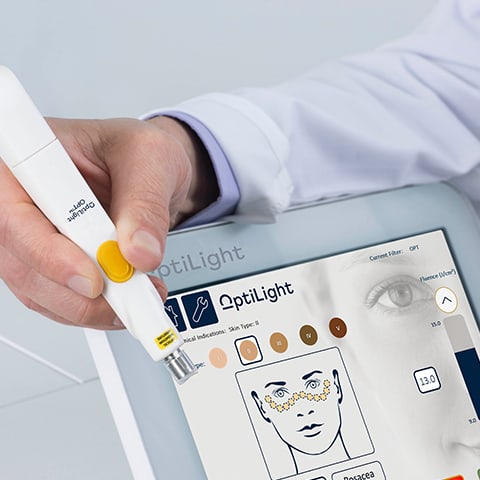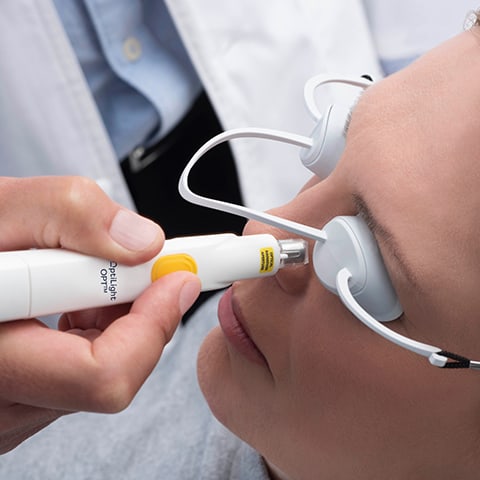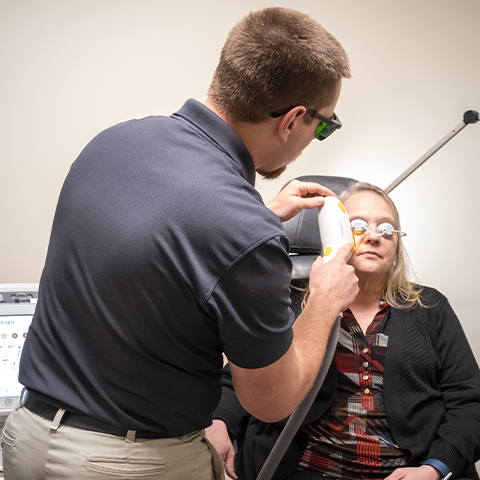Preserving Your Long-Term Vision
Eye disease can come in many different forms, and our team takes a hands-on approach to detecting, managing, and treating the different forms of eye disease.
For decades, our team at Allen Eye Associates has been looking for new ways to help our patients manage eye disease through diagnostic technology and innovative treatment methods.
We are always evolving and improving to better serve your needs—contact us to schedule an appointment and get your comprehensive check-up today.
Book AppointmentEarly Detection & Treatment
Early detection is key. The sooner we can detect signs of eye disease, the sooner we can begin preparing your personalized treatment plan.
Our comprehensive eye exams are designed to help keep our patients informed and educated throughout the process. We are more than happy to answer any questions and concerns you may have along the way.
Book AppointmentThe Different Forms of Eye Disease
Eye disease can come in many different forms with a variety of symptoms. Understanding the different forms of eye disease can help our patients recognize some of the early signs and schedule an eye exam for a comprehensive check-up and diagnosis.
Cataracts
Cataracts develop when the normally clear lens in your eye becomes clouded. The clouded area of cataracts can vary from small areas to larger areas, causing a noticeable loss of vision. Blurry vision, decreased night vision, and dull or muted colors can all be signs and symptoms of cataracts.
If cataracts progress to an advanced stage and prevent you from going about your daily activities, such as reading or driving, cataract surgery is the best and only option to remove them.
Glaucoma
Glaucoma is a group of eye conditions that cause damage to the optic nerve, which is responsible for sending visual information to your brain. Damage to the optic nerve can lead to vision loss and blindness if not detected and treated early.
Damage from glaucoma can be caused by abnormally high pressure in the eye, referred to as intraocular pressure. Eye injuries, family history, and age are all risk factors that can contribute to glaucoma.
It’s essential to maintain a consistent eye exam schedule for early detection.
Diabetic Eye Disease
Diabetes can increase the risk of developing eye diseases such as glaucoma, cataracts, and diabetic retinopathy, which is the primary vision loss concern for patients with diabetes.
Diabetic retinopathy is a condition that causes damage to the blood vessels of the retina. The signs of diabetic retinopathy can include blurry vision, black spots or holes in vision, a loss of central vision, and difficulty seeing well at night.
Age-Related Macular Degeneration
Age-related macular degeneration is a progressive disease that affects your central vision, damaging the macula. This damage can make activities like reading and driving more difficult. AMD is a leading cause of vision loss among older adults, and there are 2 main types:
- Dry AMD is the more common form of the disease and occurs in early, intermediate, and late stages. This form of AMD occurs when the macula thins with age.
- Wet AMD is the less common form of the disease and causes faster and more severe vision loss. Wet AMD occurs when abnormal blood vessels grow in the back of the eye and damage the macula.
Prevention methods such as giving up smoking, wearing UV protection, switching to a healthier diet, and consistent eye exams can help slow macular degeneration progression.
Our Diagnostic Technology
To get a complete picture of your eyes and vision situation, we implement diagnostic technology into our eye exams to get a complete view.
OCT
Optical coherence tomography creates high-resolution, cross-sectional images of your eyes, allowing us to check for underlying issues. This 3D image of your retina allows us to explore if your retinal layers are distorted and check for eye diseases like macular degeneration.
Optomap
The optomap is an imaging technology used to evaluate tissue at the back of the eye, including the optic nerve and retina. The optomap can capture ultra-wide views, allowing 82% of the retina to be visible in one image.
The detailed, wider view can help your doctor diagnose early signs of disease, including diabetes, stroke, macular degeneration, and retinal conditions.
ERG
An electroretinography (ERG) test or electroretinogram is a diagnostic evaluation of retina function. It measures the electrical response of light-sensitive cells (rods and cones). The retina uses rods and cones to gather visual information by detecting light properties. Cone are color sensitive, while rods are highly sensitive to light levels.
ERG results can help inform treatment or surgical approaches, such as cataract surgery or retinal reattachment.
Visual Field Test
Visual field testing or perimetry assesses a patient’s visual field. The test is commonly used to detect and monitor eye diseases affecting peripheral (side) vision, such as glaucoma.
During the test, focusing on a central point while a device emits flashing lights. Patients respond when spotting lights in their visual field.
Oculus Keratograph 5M
The OCULUS Keratograph 5M system features multiple tools for diagnosing cornea health and dry eye. The corneal topographer maps the eye’s surface, including imperfections in the normally smooth surface. The keratometer measures corneal curvature, assessing the steepness or axial length (lengthwise).
The color camera captures images of eye structures like the meibomian glands to evaluate the tear film (the eye’s moisture layer).
Your Eye Health Comes First
Our team has the experience, skill, and passion to help manage eye disease in its different forms. We aim to preserve your long-term visual health through early detection and treatment.
Contact us to schedule your comprehensive eye exam and get ahead of eye disease today.
Book AppointmentVisit Us in Oneida

Our Address
- 131 Main Street, Suite 202
- Oneida, NY 13421
Contact Information
- Phone: 315-363-4942
- Email: [email protected]
Hours of Operation
- Monday: 8:00 AM – 5:00 PM
- Tuesday: 8:00 AM – 5:00 PM
- Wednesday: 8:00 AM – 5:00 PM
- Thursday: 8:00 AM – 5:00 PM
- Friday: 8:00 AM – 5:00 PM
- Saturday: By Appointment Only
- Sunday: Closed

Our Brands










